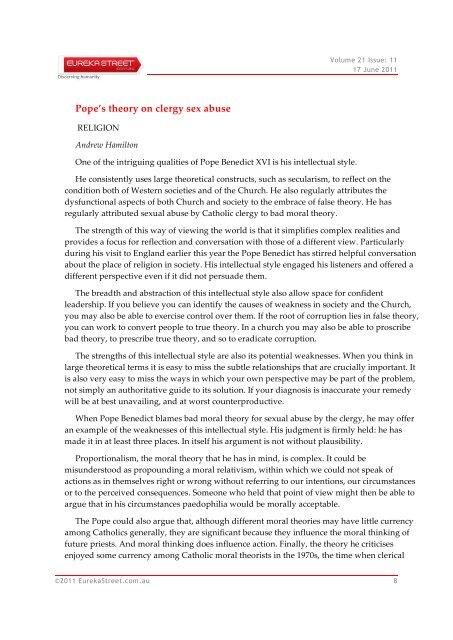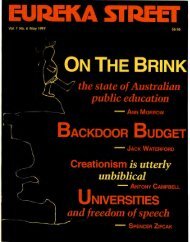17 June 2011 Volume: 21 Issue: 11 Australia's ... - Eureka Street
17 June 2011 Volume: 21 Issue: 11 Australia's ... - Eureka Street
17 June 2011 Volume: 21 Issue: 11 Australia's ... - Eureka Street
You also want an ePaper? Increase the reach of your titles
YUMPU automatically turns print PDFs into web optimized ePapers that Google loves.
<strong>Volume</strong> <strong>21</strong> <strong>Issue</strong>: <strong>11</strong><strong>17</strong> <strong>June</strong> <strong>20<strong>11</strong></strong>Pope’s theory on clergy sex abuseRELIGIONAndrew HamiltonOne of the intriguing qualities of Pope Benedict XVI is his intellectual style.He consistently uses large theoretical constructs, such as secularism, to reflect on thecondition both of Western societies and of the Church. He also regularly attributes thedysfunctional aspects of both Church and society to the embrace of false theory. He hasregularly attributed sexual abuse by Catholic clergy to bad moral theory.The strength of this way of viewing the world is that it simplifies complex realities andprovides a focus for reflection and conversation with those of a different view. Particularlyduring his visit to England earlier this year the Pope Benedict has stirred helpful conversationabout the place of religion in society. His intellectual style engaged his listeners and offered adifferent perspective even if it did not persuade them.The breadth and abstraction of this intellectual style also allow space for confidentleadership. If you believe you can identify the causes of weakness in society and the Church,you may also be able to exercise control over them. If the root of corruption lies in false theory,you can work to convert people to true theory. In a church you may also be able to proscribebad theory, to prescribe true theory, and so to eradicate corruption.The strengths of this intellectual style are also its potential weaknesses. When you think inlarge theoretical terms it is easy to miss the subtle relationships that are crucially important. Itis also very easy to miss the ways in which your own perspective may be part of the problem,not simply an authoritative guide to its solution. If your diagnosis is inaccurate your remedywill be at best unavailing, and at worst counterproductive.When Pope Benedict blames bad moral theory for sexual abuse by the clergy, he may offeran example of the weaknesses of this intellectual style. His judgment is firmly held: he hasmade it in at least three places. In itself his argument is not without plausibility.Proportionalism, the moral theory that he has in mind, is complex. It could bemisunderstood as propounding a moral relativism, within which we could not speak ofactions as in themselves right or wrong without referring to our intentions, our circumstancesor to the perceived consequences. Someone who held that point of view might then be able toargue that in his circumstances paedophilia would be morally acceptable.The Pope could also argue that, although different moral theories may have little currencyamong Catholics generally, they are significant because they influence the moral thinking offuture priests. And moral thinking does influence action. Finally, the theory he criticisesenjoyed some currency among Catholic moral theorists in the 1970s, the time when clerical©<strong>20<strong>11</strong></strong> <strong>Eureka</strong><strong>Street</strong>.com.au 8
















